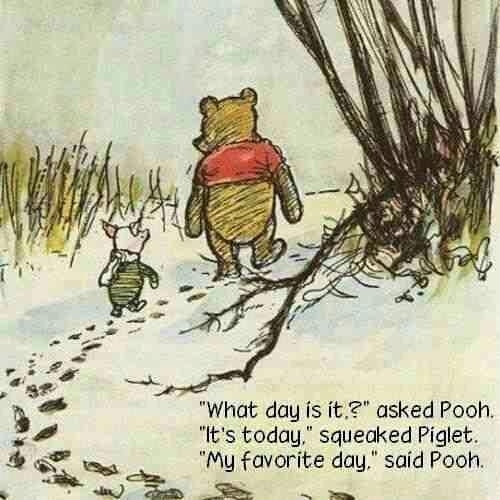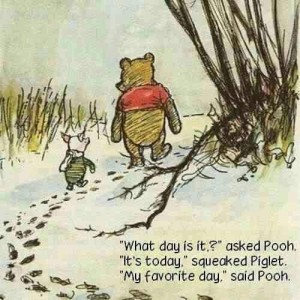

Everyone remembers Pooh.
In Winnie the Pooh stories, Pooh is the main character. He is the honey loving bear, the protagonist, the unflappable, reliable, turn-to sort of character. He is most kids’ favorite character and probably the author’s favorite too–even the title of the series is named after Pooh. Pooh is easy going and humble; he is earnest, loving and lovable. He is essentially the most important character in the book.
But what about Piglet?
Piglet is like the awkward cousin in the family that relatives know about but tend to forget. He is timid and shy. But in his book The Te of Piglet, author Benjamin Hoff argues that Piglet is just as important, if not more so, than Pooh. Te is a Chinese character meaning virtue in action, or virtue of the small. Hoff writes, “[Te is] a quality of special character, spiritual strength, or hidden potential unique to the individual” (23). And Piglet is the unlikely character in the Winnie the Pooh stories who contains such a trait.
Taoism is centered upon the underdog, be it the poor, be it children, or in this case, small animals. To Taoists, Heaven, Hoff writes, is biased toward “the humble, the weak, the small” (42). Or, essentially, Piglet.
As a small animal, Piglet has plenty of opportunities to mope over his inability to be as great or as memorable as Pooh. Piglet’s smallness, both literally and figuratively, has the ability to make him insignificant. But Piglet is the “only one of the [characters] to change, to grow, to become more than what he was in the first place” (50). Piglet does not grow by denying his smallness; rather, Piglet grows, changes, and becomes great by embracing his smallness and using it for the good of others.
But Piglet must watch out for other characters, such as an unhappy, miserable Eeyore who drags himself and others down and an over-enthusiastic, over-confident Tigger who is never truly satisfied. He finds his power and strength in being sensitive, modest, and small. Sensitivity doesn’t always need to have a negative connotation–in this instance, Piglet’s ability to be sensitive allows him to be respectful to others, alert, and so on. His modesty and humility make him lovable, and his smallness makes him underestimated, but also quick, energetic, and adaptable.
One of the greatest lessons Piglet provides is the importance of Te– the importance of virtue and power of the small. Through Te, Piglet transforms into a powerful, even honorable character.
The story of Piglet, and the other Winnie the Pooh characters, originated in 1926. Since then, one would expect there to be plenty of other literature with characters that model Piglet. But after looking at well known literature and TV shows, such as RugRats, Arthur, Nancy Drew books, Spongebob–even the beloved Harry Potter series–something somewhat frightening becomes apparent: there are no Piglets left.
There are no Piglets left because characters in these movies, books, and TV shows are confident, aware of their abilities, and know that they are destined to be great. Harry Potter, for example, is constantly aware of his position at Hogwarts: he is favored by the majority of the teachers and students, he knows that he has the ability to beat Voldemort, and he is confident, and to a certain degree, almost arrogant.
But what does that mean for our society if we are unable to model after Piglet?
Society tends to gravitate toward the obvious hero, be it Harry Potter or Luke Skywalker or The Rock or Bruce Willis. But society as a whole only functions and accomplishes milestones when a small, timid, quiet person stands up and becomes an example and a model for others. Rosa Parks, for example, was just a quiet woman riding the bus when she refused to give up her seat and move to the colored section. Her action became the epitome of non-violent protests and sparked other civil rights acts, such as the Montgomery Bus Boycott.
Society can only adapt, evolve, and grow when Piglets lead the way. While society overlooks such people, who are fearful but become fearless, who are powerless but become powerful, nothing can or will change without them.
People want a hero, but what they really need is a Piglet.
Well, I never thought all that much about Piglet but did like him. Now when I read any of the stories, I will be thinking differently about Piglet. What a great article, Helen,
Pooh was always my favorite when I was little and I have never thought about Piglet that way. It’s kinda cool 🙂 haha
I think piglet is small character in the Winnie the pooh. i like him its cool. 😀